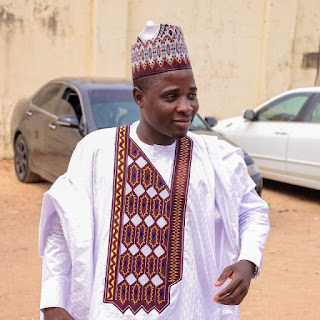Uncategorized
COVID 19: Secure Kano Borders, CITAD charges Kano Government.
Uncategorized
Deputy Senate President Distributes New Motorcycles To Barau FC Players, Officials
The deputy president of the Senate, Dr. Barau I. Jibrin, donated motorcycles to the Barau Football Club players and officials.
In a statement signed the club’s Media Officer Ahmad Hamisu Gwale, revealed that the distribution of the motorcycles was held on Sunday 20 October 2024, during an event at the Aztec mini stadium centre, Dangi, roundabout, Kano.
Recalling that, Barau Jibrin had on June this year (2024) promised donations of a brand-new motorcycle to each player and official of the team, in celebration of their triumph and promotion to the Nigerian National League NNL.
Speaking at the ceremony, Barau I. Jibrin, said the gesture was to ease the movements of the players and officals, with a view to boosting the welfare of the clubs.
Represented by his chief of staff, Professor Muhammad Ibn Abdullahi, the deputy president of the Senate, reiterated his commitment to contribute and making the club self-reliant.
“This is not the first, and it will not be the last. By Allah’s grace, he will continue to carry out our intervention programmes to enable our people to be self-reliant,” Mr Abdullahi said.
In his remarks, the Barau FC Chairman Ibrahim Shitu Chanji, thanked Barau Jibrin for his endavors commitment to the club.
He also commended the Deputy President of the Senate for his commitment to football development in Kano and the country.
Najib Yusuf, while speaking on behalf of the players, thanked Barau Jibrin, satisfied to play for the Barau Football Club, commited to admiring being part of the team.
The distribution ceremony, attendent by Shawwal Barau Jibrin, the President of the Barau FC, Professor Abdullahi Shehu Ma’aji, managing director of North West Development Commission NWDC.
Also, the event had gatherd thousands of the Deputy President of the Senate aids, supporters, and well-wishers were all attendance.
News
Muslim-Muslim Ticket: idea fixation pathetic, religion be excluded in politics and governance, says El-Rufai
The Governor of Kaduna State, Mallam Nasir El-Rufai, has described the possibility that the ruling All Progressives Congress, APC, would run a Muslim-Muslim ticket in the 2023 presidential election as mere speculation.
Making a remark on Channels TV’s political show, Politics Today, he said, Nigerians’ obsession with religion – when it comes to voting – rather than competence is sad. “This fixation of Nigerians on religion instead of competence, capacity, and capability is quite sad and pathetic.”
El-Rufai said that anyone asking him questions about the controversial Muslim-Muslim presidential ticket is asking the wrong person, because, in the 2019 general election he settled for a qualified Muslim woman as a running mate and won the election in Kaduna State.
He said, “I don’t look at people from Muslim-Muslim or Christian-Christian angle. Most of my closest friends are Christians. It was Pastor Tunde Bakare, a Pentecostal pastor, that took me to the CPC, not President Buhari. I’m very close to Bakare. I’m very close to many Christians. I don’t think the business of governance has anything to do with religion. I think we should look for the best person for the job. A person that will get the job done and let him do that.”
He advised Nigerian journalists to keep religion out of politics and government. He said, “I don’t think we should be looking at religion. We want to develop this country. When I get into a plane, I don’t ask about the religion of the pilot. When I go to the hospital, I don’t ask for the doctor’s religion of the doctor, I just want to get well. I just want to get to my destination when in an aircraft.
Column
Nigerian Universities, the interference of Professional bodies, and the time bomb
-

 Opinion4 years ago
Opinion4 years agoOn The Kano Flyovers And Public Perception
-

 Features5 years ago
Features5 years agoHow I Became A Multimillionaire In Nigeria – Hadiza Gabon
-

 Opinion5 years ago
Opinion5 years agoKano As future Headquarters Of Poverty In Nigeria
-

 History5 years ago
History5 years agoSheikh Adam Abdullahi Al-Ilory (1917-1992):Nigeria’s Islamic Scholar Who Wrote Over 100 Books And Journals
-

 Opinion4 years ago
Opinion4 years agoMy First Encounter with Nasiru Gawuna, the Humble Deputy Governor
-

 History5 years ago
History5 years agoThe Origin Of “Mammy Market” In Army Barracks (Mammy Ochefu)
-

 History4 years ago
History4 years agoThe History Of Borno State Governor Professor Babagana Umara Zulum
-

 News4 years ago
News4 years agoFederal University Of Technology Babura To Commence Academic Activities September
